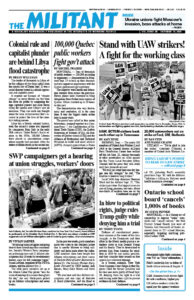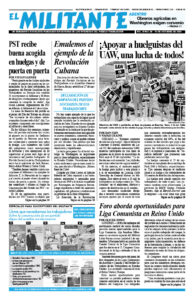The deaths of thousands in Libya after the collapse of two dams uphill from the coastal city of Derna Sept. 11 was a social disaster rooted in colonial oppression and capitalist greed.
It resulted not because of “climate change,” as many liberals say, but from the drive for profits by competing foreign capitalist powers and local forces vying for control over Libya’s vast oil resources. They cast aside any thought about the basic infrastructure that’s essential to protect the lives of the country’s toiling masses.
Libya has a bloody colonial history, even the country’s name was imposed by conquerors from Italy in the early 20th century. Under Rome’s fascist regime in the 1930s, 100,000 Libyans were placed in concentration camps where roughly half perished. After the defeat of Italian forces in the second imperialist world war the British and French rulers took control of a largely destroyed country.
During anti-colonial struggles after the war, Libya won its independence in 1951. After the discovery of oil in the late 1950s, the imperialist powers looked to profit. A coup in 1969 brought Moammar Gadhafi to power. Following an uprising against his authoritarian rule in 2011, U.S.-led NATO forces carried out more than 9,600 bombing missions, overthrew his regime and killed him.
This history of colonial plunder has left Libya impoverished, with no central ruling government, and an object of big-power intrigue.
The two dams, built of clay and rock in the late 1970s, have for decades needed major maintenance work and upgrades. This was never done. Torrential rains have been pounding the area for years. Each time the dams were further damaged, until they finally gave out.
Entire neighborhoods in Derna, a city of nearly 90,000, were washed into the sea. Buildings fell into the mud, trapping residents under rubble. The rampaging tide shattered roads and bridges. More than 6,000 people were killed and thousands more are still missing. Over 43,000 survivors have been displaced.
Construction worker Mohamad Mahmoud Ismail Al-Shalwi rushed back to Derna. “When I came, I found everything — my building, my family, the whole neighborhood — under the sea,” he told NBC News.
The day before the storm hit, Derna’s then-mayor, Abdel-Moneim al-Ghaithi, told the media some areas near the dam should be evacuated. Instead, authorities imposed a curfew and told residents to shelter at home.
In the absence of government response, volunteers and aid workers from other towns and cities have come to help. Nawal Alghazal, a 62-year-old resident of Benghazi, started a campaign to collect breast milk to feed babies whose mothers are dead or missing. “The least we can do for our country and the people in Derna is to take care of their children,” she told the Guardian.
Since the 2011 mass uprising and imperialist murder of Gadhafi there’s been no stable government in Libya, leaving working people to fend for themselves.
In western Libya, Abdul Hamid Dbeiba heads the Government of National Unity. Arrayed against his rule is Libyan National Army Gen. Khalifa Haftar, who is based in the eastern part of the country, where Derna is located.
Decades of inaction on dam repairs
The residents of Derna are “extremely vulnerable to flood risk,” wrote Abdelwanees Ashoor, a hydraulic engineer at Omar Al-Mukhtar University in Libya, in 2022. “In the event of a big flood, the consequences will be disastrous.”
Ten years after major damage to the dam from the 1986 storm, a government study revealed cracks and fissures in the dam. But it wasn’t until 2007 that a Turkish company, Arsel, was hired to repair the dams and build a new one. Initial work didn’t begin until three years later, then was halted in 2011 as protests mounted against Gadhafi’s rule. Arsel left the country. No concrete or asphalt had been poured, nor pipes laid.
Government funds allocated to dam repair disappeared. The ruling factions, as well as the imperialist powers, knew the danger that was looming. But this was not a major concern for Washington, London, Paris or Rome, whose priority was finding a road to reap superprofits through exploiting Libya’s vast oil wealth. Nor for the rival capitalist forces inside Libya vying to take their share of the booty.

